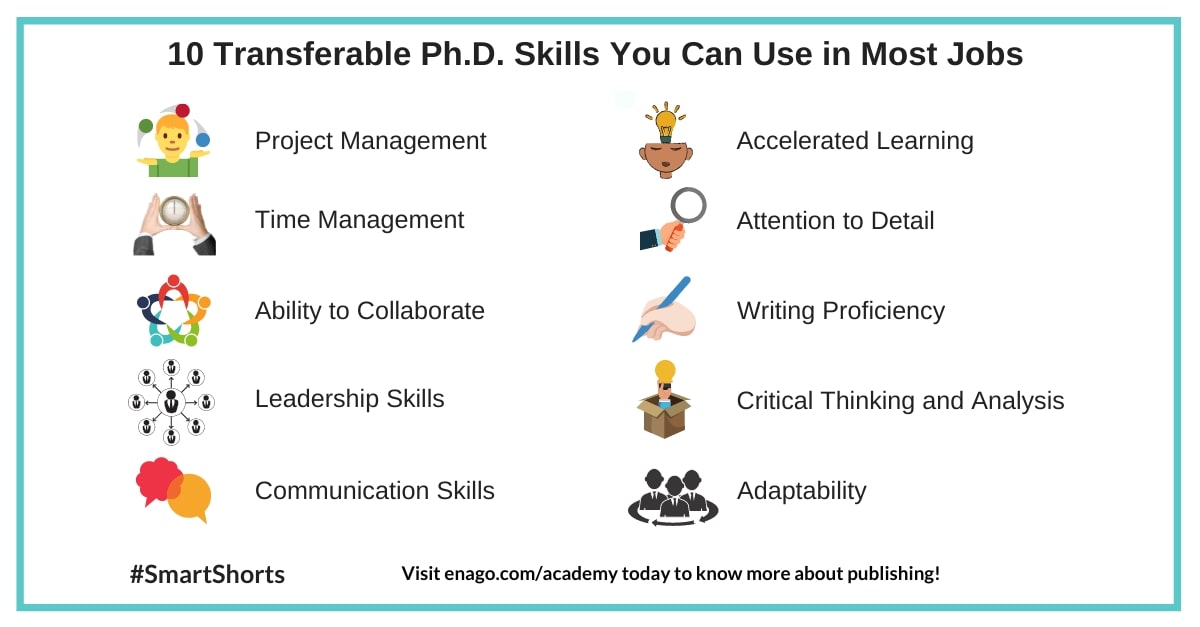10 PhD Transferable Skills You Can Use in Most Jobs
“No one wants to hire PhDs because they are overqualified and too independent!”
This is one thing PhDs are tired of hearing. How can your PhD be a liability to your career? Rather, recruiters prefer PhD candidates over others not just for their qualification but for their PhD transferable skills.
What are PhD Transferable Skills?
PhD Transferable skills are exactly what the name suggests! These are skills other than technical skills that you develop in your academic program. Furthermore, these skills are so versatile that they can be used everywhere, irrespective of the designation or field. Transferable skills are desirable because if you already have them, your employer will not have to train you on them. Consequently, you can make positive contributions in any career with these skills.

Which are the PhD Transferable Skills that You Must Develop?
Considering that a doctorate degree is the highest degree in most fields, the skills that are required to excel in the same are impeccable. Undoubtedly, researchers pursuing their Ph.Ds. or postdocs develop technical skills related to their research. However, what they also need to develop is a host of research transferable skills they can use as they progress in their careers.
Which are 10 PhD Transferable Skills You Can Use in Most Jobs?
With the surge of jobs for PhD in STEM, recruiters struggle to fill those positions with talented candidates. They are always in need of trained professionals who know how to create information from scratch, and not just recreate it in a tinkering manner.
While your work experience and education during PhD is an asset, you’d be surprised to find out that employers in most sectors pay close attention to your skill set. According to a recently published survey report by LinkedIn, 57% of respondents identified soft transferable skills as more important than hard skills (technical knowledge).
Here, we list 10 significant PhD transferable skills students can use in most jobs.
1. Project Management
The most apparent thought that comes to anyone’s mind while thinking about PhD is “project management” skills. A successful research experience goes hand-in-hand with a well-planned project. As simple as it may sound, the management skills of a PhD graduate are not confined to his/her project. It starts right from ideation of the research project to final submission, which results in an ultimate success of the project. Different stages of a PhD’s journey demands customized planning and organizing to ensure that deadlines are met and projects are completed efficiently and effectively. Furthermore, a PhD makes sure that all plans are duly incorporated. Employers seek candidates with PhD transferable skills as they want someone who can not only see a task through, but can visualize what needs to happen on a project from start to finish.
2. Accelerated Learning
As a doctor of philosophy, the ability to ascertain knowledge runs thick in the veins of a PhD researcher. An inquisitive mind and quick comprehension of technical things is interlinked to your accelerated learning ability. Moreover, being a PhD, you attend conferences and read papers to stay on top of the latest trends in your field. Consequently, PhD transferable skills ensure employers of your ability to understand technical procedures, protocols, and methodologies.
3. Time Management
Time waits for none! The key to a tension-free and smooth workflow is effective time management. While planning is important, defining your deadlines, setting realistic and achievable goals, and adhering to them takes you a long way! At a job, every moment spent on an unfocused or frivolous task, is a waste of money. Contradictorily, time management may not be viewed similarly in academia. However, as a PhD your motive has been to complete your program in time. This acts as a serious motivation to develop excellent time management skills.
4. Attention to Detail
One of the essential core skills of a PhD is paying attention to the details. To the best of your experience as a researcher, you are aware that mistakes can be missed in the bat of an eye. Therefore, it is a known fact that PhDs are one of the finest people to make sure that each project runs through a fine-tooth comb. As a result, employers can count on you for detail-oriented assignments that require critical assessment and corrections.
5. Ability to Collaborate
As stated earlier, PhDs are not new to working in groups to achieve common goals. Your significant contribution in research groups, as a researcher and author during your PhD program demonstrates your ability to collaborate. Employers seek candidates who are team players making positive contributions to the success of a group.
6. Writing Proficiency
Given the nature of modern technology, writing may not be a primary task of most job profiles. However, it sure is an essential element for academic and allied knowledge dissemination careers. In due course of pursuing a PhD, you come across countless reading material from authors all around the world. This subsequently stocks up your bank of vocabulary and enhances your writing skills for an unambiguous conveyance of messages and information.
7. Leadership Skills
Leadership skills aren’t only your ability to supervise and manage a team, but to take the lead on a project and get a team to follow through and achieve goals. As a PhD you’re the “lead” for your project. While it doesn’t necessarily involve leading other people, it still means being responsible for major decisions to accomplish targets. Additionally, it is common for PhD students to work in research groups and collaborate on shared projects. Nonetheless, they also demonstrate leadership while organizing conferences and seminars for their department or university. PhDs are also seen showing leadership skills while advising students and mentoring peers.
8. Critical Thinking and Analysis
As a PhD, it’s a given that you are able to analyze data and provide logical reasoning to it. Throughout your program, you collect data, analyze it, and draw conclusions. The ability of a PhD to critically examine everything and deliver logical reasoning behind it is not new to anyone. A PhD is well versed with 360-degree logical thinking without being biased. Employers seek these research transferable skill of a PhD to consider alternative solutions to a problem and suggest next steps for efficient functioning.
9. Communication Skills
This is the master of PhD transferable skills. Even if you decide to step into a career that is a 180-degree sweep from your PhD, you’d still need to communicate! Your ability to communicate efficiently is developed right from preparing for your PhD interview, presenting papers and posters at academic conferences, defending your thesis, etc. As verbal communication affects your ability to work with your peers, it is one of the most sought after research transferable skills by employers.
10. Adaptability
A PhD isn’t only about specialization. Rather, it’s about the ability to specialize. During your PhD you learn to tackle a new topic, solve it, and move on to the next problem. Almost all careers require employees to focus on specific topics and projects in detail to achieve a specific goal. Your ability of in-depth specialization in academic research project demonstrates adaptability and flexibility—quite literally!
So the next time you are asked, “What skills do you bring to this position?”, you certainly know how to answer that! Brush up your PhD transferable skills to help you make the right career switch. Remember that your PhD isn’t a liability after all. In fact, it’s an asset! Let us know how you acquired these valuable skills that are highly sought after by employers today.










